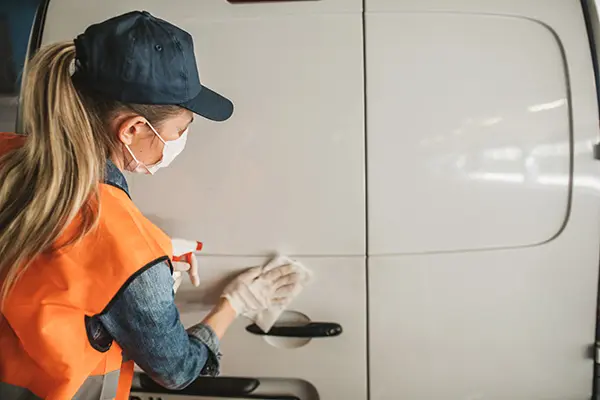UML-based Institute Uses Federal Funding to Host Virtual Workshops
 Image by Getty Images
Image by Getty Images
04/21/2020
By Katharine Webster
As employees in nursing homes and hospitals, grocery stores and jails experience a surge in illness from exposure to the novel coronavirus, The New England Consortium is offering free trainings on how to keep essential workers safe.
The New England Consortium (TNEC), a model hazardous waste and emergency response worker health and safety training institute based at UMass Lowell, held its first two-hour workshop on April 9 by interactive videoconference.
Now, the free workshops are booking up fast, according to David Turcotte, research professor of economics, who is also the principal investigator at TNEC.
“We’ve had a great response. All the other trainings for April are completely full,” Turcotte said.
The workshops cover the basics of COVID-19 and how it’s transmitted; how to assess risks for exposure and infection; different ways of controlling the work environment to minimize those risks; updated OSHA guidance that applies specifically to COVID-19; and workers’ rights, including the right to be provided with personal protective gear and educated in how to use it.
The workshops are led by trainers from TNEC and other consortium members. All of them emphasized the critical importance of immediately granting sick leave to ill or quarantined employees.
“Requirements for a doctor’s note should be relaxed right now because the CDC (Centers for Disease Control and Prevention) is asking people to stay at home and not go to the hospital or a doctor’s office if they have mild symptoms,” said TNEC trainer Patricia Strizak.
The first training was attended by workplace health and safety managers, union representatives, workers and supervisors. One of them was Alan Arrajj, a project management superintendent on construction sites who is based in the Boston office of Avison Young, an international real estate services company.
“I usually have 10 to 40 subcontractors on my site. Everybody has their own tools and is responsible for their own safety, but I’m responsible for the general safety of the job site,” Arrajj said.
Although most of his company’s work sites are shut down now – Boston Mayor Marty Walsh ordered a halt to all nonessential construction – Arrajj said he’s taking advantage of the closure to have all of the heavy machinery and work areas cleaned. He has also pushed for better bathroom facilities, more hand-washing stations and a separate decontamination area that all workers can use.
“I feel very fortunate to be able to go through this training so I can reinforce what needs to be done and what we’re doing,” he said.
Erika Pouliot, environmental health and safety director for High Liner Foods, a frozen seafood company with operations in Portsmouth, N.H., that is considered an essential business, said her company already has strong food and employee health and safety protocols at its facilities across North America, including frequent hand-washing for workers and frequent disinfection of all work surfaces.
Now, in response to the COVID-19 pandemic, they’ve added even more, including disinfection procedures for frequently touched objects like radios and time clocks. But decontamination is just the beginning.
“We’re staggering breaks and we’ve opened up two additional break rooms so that each worker can sit at their own table to eat lunch. We’ve eliminated visitors and vendors, and drivers can’t enter the plants,” she said. “We are also trying to space workers out on the floor as much as possible.”
High Liner Foods is also trying to obtain personal protective equipment for workers, including disposable face masks, since homemade cloth face coverings aren’t suitable for use in food processing plants, she said.
Pouliot and others got advice about sourcing and reusing personal protective equipment (PPE) from David Coffey, training manager for TNEC, who led the COVID-19 safety workshop. He acknowledged the difficulty that essential employers are confronting in their efforts to get adequate PPE.
“Not having sufficient PPE is a huge risk for workers,” Coffey said. “I wouldn’t have thought a year ago about reusing PPE, but now there’s guidance from the CDC for that.”
The trainers urged attendees to stay updated with current information on worker safety and COVID-19 from reliable sources, including the CDC, OSHA, the World Health Organization, the National Institute for Occupational Safety and Health and the National Institute for Environmental Health Science (NIEHS), which is part of the National Institutes for Health.
The virtual training program was developed by NIEHS under emergency legislation that included funding for government agencies to combat the spread of COVID-19. TNEC is one of several NIEHS-funded agencies across the country selected and trained to provide the interactive, discussion-based workshops. There is also a self-guided, online version for first responders.
TNEC is offering the free workshops on Tuesdays and Thursdays, and is now working on scheduling more in May. TNEC can also customize the training for individual employers and their specific needs by request, Turcotte and Coffey said.




